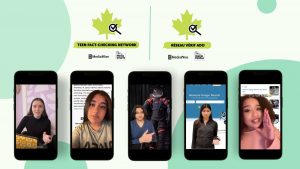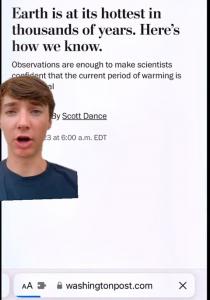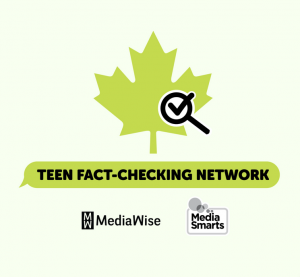How many false or misleading stories and images have you come across on social media? How many stories that look “too good to be true”?
How do you know the difference? How do today’s young people know the difference? How does your teenage son, daughter, niece, nephew, friend, or student navigate among all the information, mis-information, dis-information out there?
Ask another teen, of course!
Today’s Gen Z teens are variously considered the largest group of social media users (percentage of age group), and the group that uses it the most (per hour on a daily basis). So, to empower them to combat the proliferation of misinformation, to invest them with the abilities to double-check, corroborate, and verify any information encountered online seems essential.
In fact, groups of Teen Fact-Checkers are coming together across the globe to work together and fact-check the online information we see.
And now, North America’s second Teen Fact-Checking Network (TFCN) has launched, thanks to a partnership between MediaSmarts, a Canadian non-profit organization, and MediaWise, a media literacy initiative from the U.S.-based Poynter Institute.

The Canadian Teen Fact-Checking Network is a bilingual project with two newsrooms, one in English and one in French.
The Canadian Teen Fact-Checking Network is a bilingual project with two newsrooms, one in English and one in French. Both newsrooms fact-check claims and teach media literacy skills that resonate with their communities. This program joins the global Teen Fact-Checking Network initiative in the United States, Brazil, Germany, India, and Spain.
The media awareness and advocacy organizations are supporting teens ages 13 to 18 who are interested in fact-checking stories and helping to create digital media literacy videos for MediaSmarts’ TikTok, YouTube Shorts and Instagram Reels channels.
Once a fact-check pitch has been approved, the teens work together to research a topic, write a script, gather production elements, and record and edit at least one video for streaming on a social media channel (you can check out some MediaWise fact-checking videos on TikTok and Instagram).
“As the need for media literacy in North America becomes ever more crucial, partnering with MediaSmarts to launch the Canadian Teen Fact-Checking Network is a natural step forward for our collaborative efforts,” announced Brittani Kollar, deputy director of MediaWise. “What we consume online does not adhere to geographical boundaries, and as neighbours, I am very excited to join efforts with MediaSmarts in media literacy education.”
The goal for TFCNs is to empower and educate teens so they can combat misinformation where they spend most of their time: social media. Using short form videos that resonate with their peer group much as other online content does, teen fact-checkers make use of the same kind of tools professional journalists use to separate fact from fiction, like reverse image searches, and they engage friends and family in conversations about misinformation.
MediaSmarts is Canada’s bilingual centre for digital media literacy and a registered charity; active in conducting research and developing resources since 1996, it works with K-12 students, educators, parents and people of all ages. Its available resources include guides, videos, games, tutorials, blogs and tips for the general public as well as lesson plans and frameworks for educators – all with the idea of boosting awareness around the importance of media literacy in Canada.
“We are thrilled to be a part of this groundbreaking program in partnership with MediaWise,” added Kathryn Hill, executive director at MediaSmarts. “While Gen Z are prolific social media users, teenagers are not immune to the challenges of our rapidly evolving digital ecosystem, and our research shows they encounter misinformation often.
“We believe the best way to teach Canadian teens fact-checking skills is by reaching them on the social media platforms they use and having them learn from their peers. This program allows us to do just that.”
The Canadian Teen Fact-Checking Network expansion is also made possible with support from the Google News Initiative.

Canadian teens are fact-checking the news they see on social media platforms as part of the bilingual Canadian Teen Fact-Checking Network and MediaSmarts.
While applications for the English speaking newsroom are complete at present, applications for the French language program are accepted on a rolling basis, according to Susana Mas, MediaSmart’s Manager of Educational and Community Outreach and the TFCN program manager.
She is also responsible for overseeing the expansion of MediaSmart’s national education program beyond K-12 to include new partners in under-served communities.
It’s both her current role at MediaSmarts, her more than 15 years of experience in journalism (including work as a Parliamentary journalist for CBC, CTV, and the Ottawa Citizen), and her work as an independent journalist that’s behind her concerns about mis- and dis-information. She has long focused on collaborating with groups that support teaching digital and media literacy among immigrants, educators, students, and the public-at-large with a particular focus on fact-checking skills.
MediaSmarts, Canada’s bilingual centre for digital media literacy is a registered charity conducting research, developing resources, and advancing digital media literacy since 1996.
The organization conducts and disseminates original research that informs resource development and policy issues related to all media. It also creates free, bilingual educational resources, provides internationally-regarded digital media literacy expertise, and conducts awareness-raising activities to further digital media literacy in Canada, including on such pressing digital media topics as mis- and dis-information, digital well-being, online hate, online privacy, screen use, online safety, cyber-bullying, advertising, representation in media and more.
The Poynter Institute is a global nonprofit working to address society’s most pressing issues by teaching journalists and journalism and improving the capacity and sustainability of news organizations and fostering trust and reliability of information. The Craig Newmark Center for Ethics and Leadership, the International Fact-Checking Network (IFCN), MediaWise and PolitiFact are all members of the Poynter organization.
MediaWise, created in 2018, is a social-first digital media literacy initiative of the nonprofit Poynter Institute. The program teaches people of all ages and backgrounds how to engage with online content, and to find trusted sources of information.
The Google News Initiative (GNI) provides programs, digital tools, training, and resources designed to help journalists around the world.

Under terms of Canada’s Online News Act, Google is paying $100 million (CDN) annually to Canadian news organizations, including major outlets and independent publishers.
The search giant has been much in the news itself recently, with reports and developments concerning Canada’s Online News Act. Google is paying $100 million (CDN) annually to Canadian news organizations, including major outlets and independent publishers. An open call to Canadian news outlets regarding eligibility or exemption from the funding made by Goggle closes at the end of April. Press Forward, the association of Canada’s top digital news sources, says it looks forward to working with Google to negotiate deals that support newer digital upstart publications, including the recognition of freelance labour in the funding formula.
While there’s no word whether teen fact checkers will be so recognized, it is apparent that news outlets following best journalistic practices, fair funding mechanisms for large and small outlets, as well as reliable, responsible reporting, are needed and necessary in civil society.
You can look it up!
# # #
Tuesday, April 2 has been dubbed International Fact Checking Day. And in support of fact-checking by all of us on a daily basis, the Poynter Institute has noted that fact-checking is NOT censorship:




